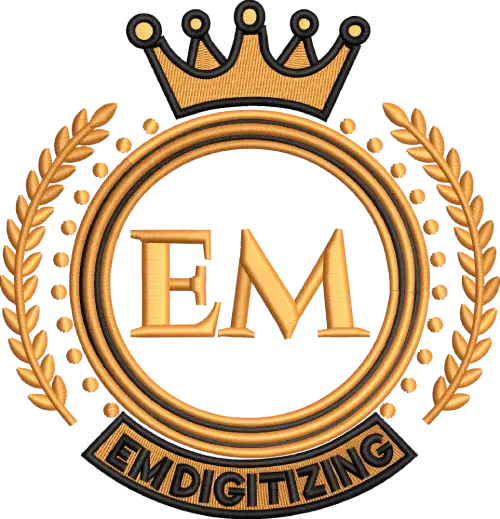Machine embroidery on chiffon fabric can add a delicate and elegant touch to any project, but it comes with its challenges. The fabric’s lightweight and sheer nature makes it tricky to work with, requiring proper tools and techniques to avoid puckering and distortion.
In this guide, we’ll show you how to successfully embroider on chiffon by covering everything from preparation to final touches, ensuring your designs come out beautifully.
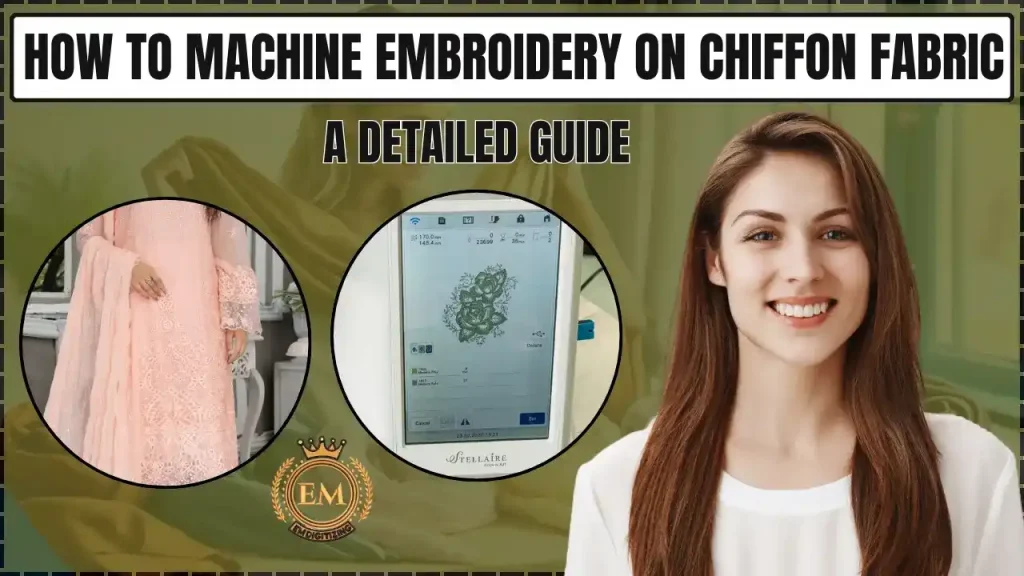
How to Machine Embroider on Chiffon Fabric: A Detailed Guide
Materials Needed for Embroidering on Chiffon
Before starting, it’s essential to gather the right materials to ensure smooth embroidery. Here’s a quick list of the tools you’ll need:
- Embroidery machine
- Chiffon fabric
- Stabilizer (tear-away or wash-away)
- Embroidery hoop
- Embroidery needles (size 75/11 sharp)
- Fine embroidery thread (40-weight polyester or rayon)
- Temporary adhesive spray or adhesive stabilizer
- Scissors
Detailed Description of Each Material:
- Embroidery Machine: Choose an embroidery machine that allows for adjustments in tension and speed. Chiffon is delicate, and you’ll need to fine-tune your machine settings to handle the fabric without damaging it.
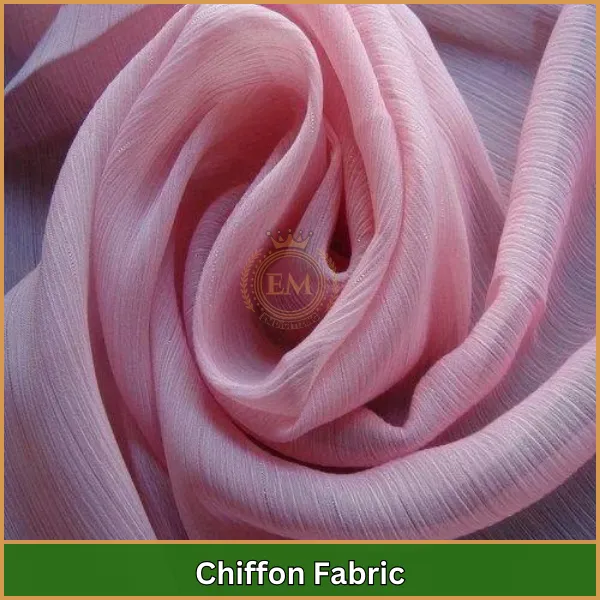
- Chiffon Fabric: As a lightweight and sheer fabric, chiffon is commonly made from silk, nylon, or polyester. Its fine texture requires careful handling during embroidery to avoid snags, puckers, or tears.
- Stabilizer: The stabilizer is critical when doing machine embroidery on chiffon. A tear-away stabilizer works well for light designs, while a wash-away stabilizer is perfect for more complex designs that need extra support without leaving residue.
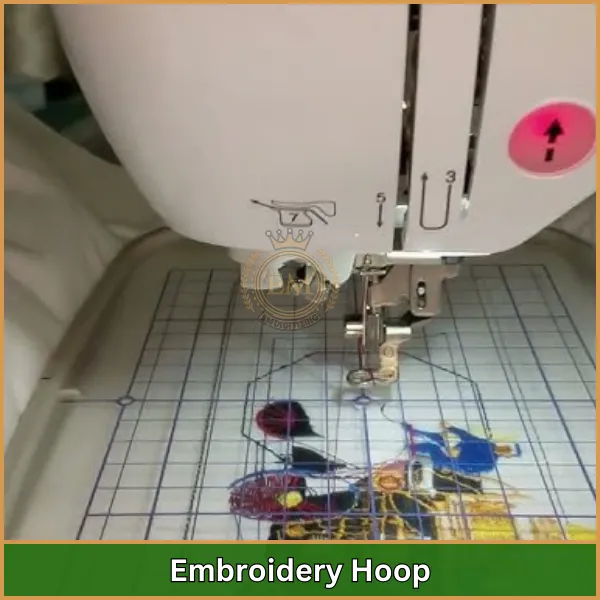
- Embroidery Hoop: Since chiffon is prone to slipping, it’s crucial to use an embroidery hoop that holds the fabric securely. Make sure not to stretch the fabric while hooping, as this could distort your design.
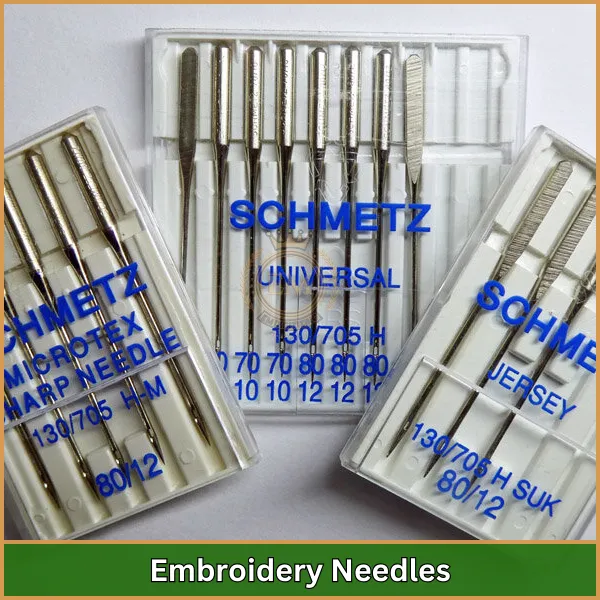
- Embroidery Needles: Size 75/11 sharp needles are ideal for chiffon. They penetrate the delicate fabric smoothly without causing damage or pulling the fibers.
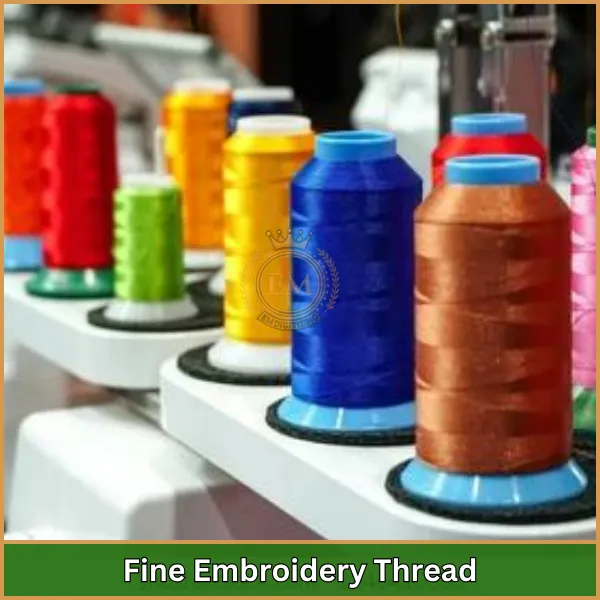
- Fine Embroidery Thread: Use lightweight thread, such as 40-weight polyester or rayon. These threads add elegance to the design while maintaining the softness of the chiffon.
- Temporary Adhesive Spray: To keep the chiffon stable during the embroidery process, you can use temporary adhesive spray to stick the stabilizer to the fabric without shifting.
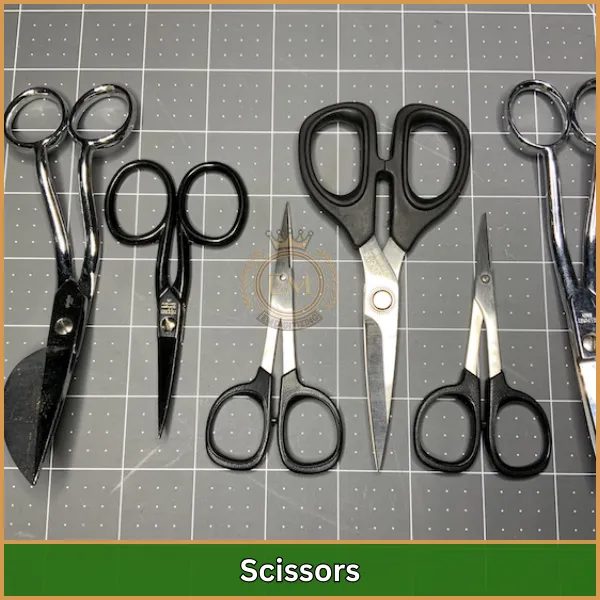
- Scissors: Small, sharp embroidery scissors are essential for trimming threads and cutting stabilizers close to the design once the embroidery is complete.
Step-by-Step Process for Machine Embroidery on Chiffon Fabric
To achieve the best results, follow these steps carefully when working on machine embroidery on fabric like chiffon.
Step 1: Preparing the Chiffon for Embroidery
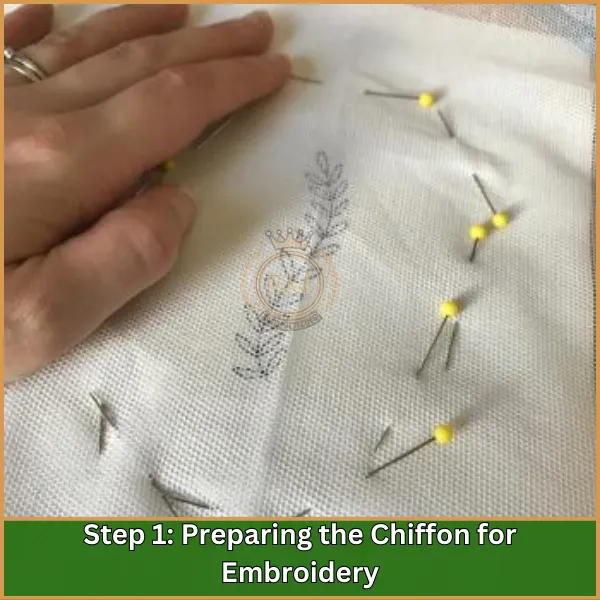
Preparation is a crucial first step when doing machine embroidery on chiffon. To ensure a successful result, follow these sub-steps:
- Choosing the Right Stabilizer: Use a stabilizer that suits the design. Tear-away stabilizers are excellent for light designs, while wash-away stabilizers work better for more intricate patterns.
- Using Temporary Adhesive: Apply a thin layer of temporary adhesive spray to the stabilizer before attaching the chiffon. This will prevent shifting during the embroidery process and reduce puckering.
- Hooping the Fabric: After attaching the stabilizer, gently place the fabric in the embroidery hoop. Make sure it’s flat and taut, but avoid stretching the chiffon, as it could distort the final embroidery design.
Step 2: Choosing the Right Embroidery Design
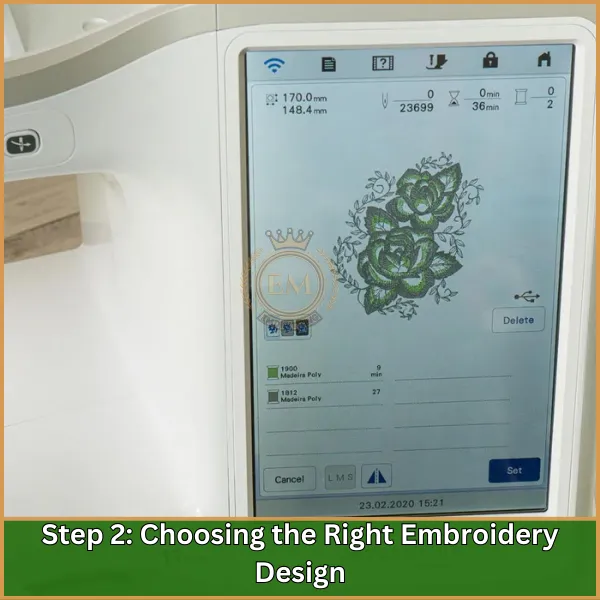
When selecting a design for machine embroidery on chiffon, opt for light and airy designs. Heavy or dense patterns can cause puckering or even tear the fabric. Choose designs that complement the fabric’s delicate nature, such as floral patterns, geometric shapes, or lace-like designs.
REMEMBER: At EMdigitizing, we offer professional embroidery digitizing services tailored to delicate fabrics like chiffon. Whether you’re looking for custom designs or need help converting artwork into embroidery files, our skilled team ensures high-quality results at affordable prices. Let us handle the technical details so you can focus on your creative embroidery projects!
Adjusting Machine Settings: Lower the speed and tension on your embroidery machine to prevent the chiffon from pulling or tearing during stitching. These settings are essential to ensure the fabric remains intact and the design is smooth.
Step 3: Embroidering on Chiffon Fabric
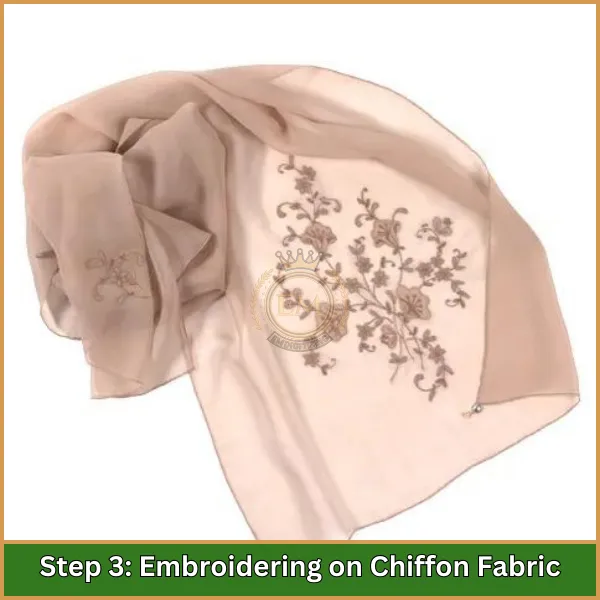
Now that your fabric is prepared and hooped, it’s time to begin the actual embroidery process.
- Running a Test Stitch: Before embroidering on your main project, it’s a good idea to run a test on a scrap piece of chiffon using the same stabilizer and design. This allows you to check the tension, thread color, and ensure the design will come out as expected.
- Starting the Embroidery: Begin stitching slowly. Since chiffon is delicate, a slower stitching speed helps keep the fabric steady and reduces the risk of puckering or misalignment.
- Monitoring During Embroidery: While embroidering, keep an eye on the process to ensure the fabric isn’t shifting or puckering. If you notice any issues, pause the machine and make adjustments. This is especially important when doing machine embroidery on chiffon, as the fabric can slip or wrinkle easily.
Step 4: Finishing Touches
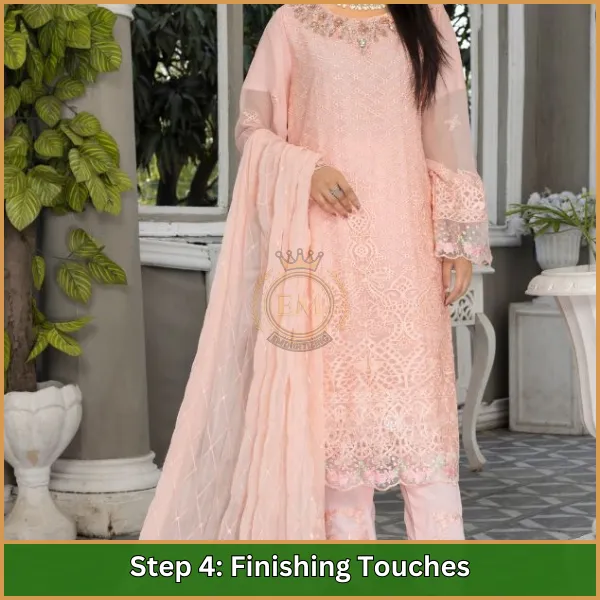
Once your design is complete, carefully remove the fabric from the hoop. Handle the chiffon gently to avoid stretching or damaging the fabric.
- Trimming Loose Threads: Use sharp scissors to trim any loose threads from the front and back of the fabric. This will give the embroidery a neat, professional appearance.
- Removing the Stabilizer: If you used a tear-away stabilizer, carefully tear it away from the back of the fabric without pulling too hard on the delicate chiffon. For wash-away stabilizers, gently rinse the area with water to dissolve the stabilizer.
Troubleshooting Common Embroidery Issues on Chiffon Fabric
Even with the best preparation, issues can sometimes arise when doing machine embroidery on chiffon. Here are a few common problems and how to fix them:
- Fabric Puckering: Puckering occurs when the fabric shifts or stretches during embroidery. To avoid this, ensure the stabilizer is properly adhered to the chiffon and that the fabric is hooped securely without being stretched.
- Thread Breakage: If the thread keeps breaking, it may be due to high tension or the wrong type of thread. Try using a lighter-weight thread and reducing the tension on your machine.
- Skipped Stitches: Skipped stitches often happen when the needle is too thick or dull for the fabric. Make sure you’re using a sharp needle (size 75/11) and replace it regularly during your embroidery projects.
Caring for Embroidered Chiffon
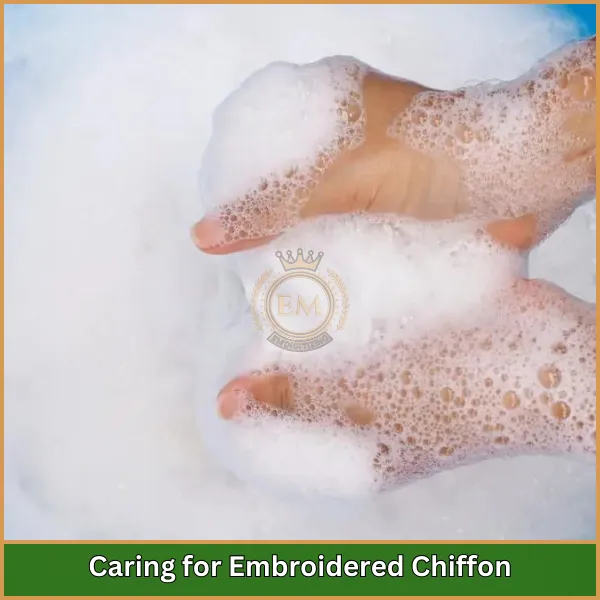
Once you’ve completed your machine embroidery on chiffon, it’s important to take proper care of the embroidered piece to ensure its longevity.
- Washing: Hand wash chiffon in cool water with a gentle detergent. Avoid scrubbing or wringing the fabric, as this could damage the embroidery. Gently press out excess water and lay the fabric flat to dry.
- Ironing: If the chiffon needs ironing, do so with great care. Set the iron to a low temperature, and always place a pressing cloth over the embroidery to protect the stitches. Avoid ironing directly on the embroidered area, as this could flatten the design or damage the thread.
Conclusion
In conclusion, if you’re planning to embroider on chiffon fabric, EMdigitizing can help make the process much smoother. We offer specialized embroidery digitizing services tailored for delicate fabrics like chiffon, ensuring that your designs come out flawless and elegant.
Our team of experts can convert any artwork into embroidery-ready files, perfectly suited for chiffon, so you can focus on the creative aspects of your project. And as a bonus, first-time clients get a 50% discount on their first order.
Contact EMdigitizing today to bring your chiffon embroidery designs to life!
FAQs
Yes, you can machine embroider on chiffon, but it requires careful handling and stabilizing to prevent puckering or damage.
Machine embroidery on sheer fabric is possible, using a suitable stabilizer to support the fabric during the embroidery process.
Fabrics that are overly stretchy, too thin, or too loosely woven, like some knits and lightweight linens, can be challenging and may not yield the best embroidery results.
The best fabrics for machine embroidery are stable, medium-weight fabrics such as cotton, linen, silk, and polyester blends that provide a smooth surface and minimal stretch.
